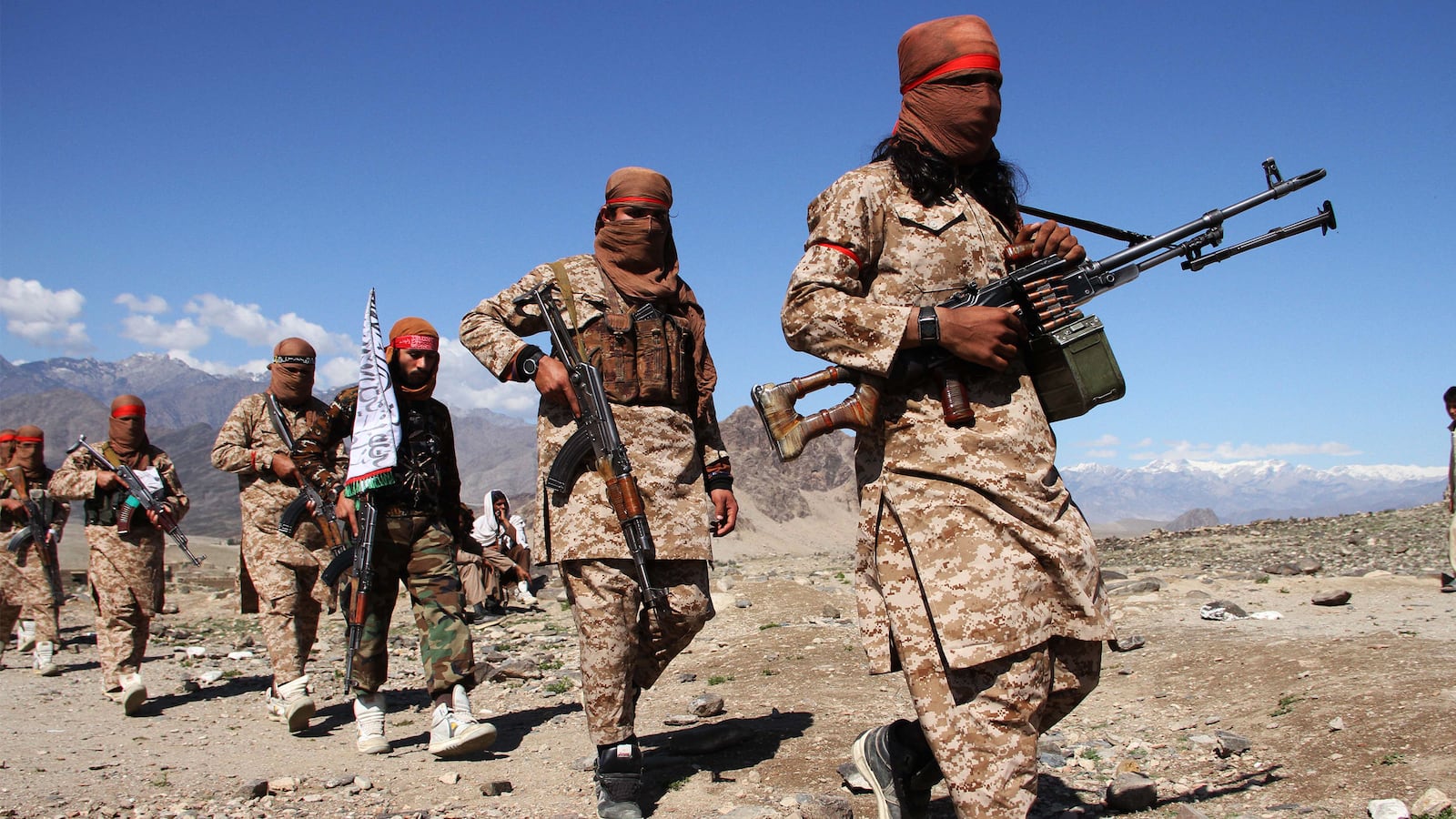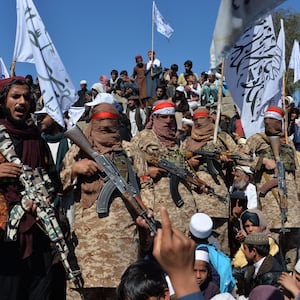The imminent withdrawal of U.S. troops from Afghanistan is breathing new life into the relationship between the Taliban and al Qaeda, according to several Afghan intelligence officials and members of both militant groups who spoke to The Daily Beast.
“The Taliban gained huge respect amongst Islamists worldwide by surviving the U.S.’s longest war,” one intelligence officer and undercover diplomat based in Afghanistan told The Daily Beast. “[The Taliban and al Qaeda] respect each other. If there is no peace and stability in Afghanistan, [they] could be each other’s darlings once again.”
The diplomat isn’t alone in his assessment. Several Afghan officials confirmed to The Daily Beast that al Qaeda is continuing to foster close relations with the Taliban insurgency, despite a U.S.-Taliban deal last year which required the militant group to break all ties with Bin Laden’s insurgency.
Sohail Shaheen, a senior member of the Taliban negotiations team, told The Daily Beast that the Biden administration’s failure to meet the original May 1 withdrawal deadline meant that all bets were off: “The U.S. violated the accord. Now, the Taliban reserves the right to attack.” Shaheen added that the Taliban now has “big numbers of volunteers on the waiting list to join Jihad.”
One al Qaeda member who lives in Peshawar referred to a “shared global agenda” with the Taliban. “We have a long struggle ahead against the U.S. and the infidels,” he told The Daily Beast. “Al Qaeda and Bin Laden's mission will never end. If the Taliban is winning the war against the U.S. in Afghanistan, it is sharing the goals of al Qaeda and Bin Laden's long last vision.”
In his announcement of the new September 11 pullout date last month, President Joe Biden argued that the post-Bin Laden al Qaeda was no longer a threat to the U.S. “We went to war with clear goals. We achieved those objectives. Bin Laden is dead, and al Qaeda is degraded in Afghanistan. And it’s time to end the forever war,” he said.
But while al Qaeda did suffer a decline since the collapse of its leadership, Afghan military personnel have reported that the group is maintaining formidable roots in the country, is active in battles in Afghanistan, and its adherents have been frequently spotted fighting alongside the Taliban.
“As a soldier on the ground, I can verify that al Qaeda and Taliban are still fighting together. We have seen them, fought them and killed them,” said one Afghan soldier, who identified himself as Karim to protect his identity.
Karim has been fighting on the front lines in Afghanistan’s southern provinces, and told The Daily Beast that he has come across foreign fighters associated with al Qaeda from Pakistan, China, Chechnya, and others. “Al Qaeda members usually help Taliban in more complicated operations where they need technical expertise,” he said.
Another Afghan military official explained that al Qaeda’s involvement with the Taliban runs even deeper.
“They are not only fighting, but also training Taliban on making IEDs, use of mortars, and small drones to conduct surveillance of Afghan checkpoints,” said Sami Sadat, commanding general of the Afghan Army’s 215 Maiwand corps, a specialised unit in the southern provinces. “Al Qaeda has been pretty active since February last year, we have seen their experts surface in the front lines and even behind enemy lines.”
Sadat added that while some of al Qaeda’s fighters are Arab, most are Pakistani members of al Qaeda in the Indian Subcontinent (AQIS), crossing over through the porous borders between the two countries.
In a recent statement shared with CNN by the insurgent group, al Qaeda members promised to continue the war against the U.S. “on all other fronts, unless they are expelled from the rest of the Islamic world.” A report by a U.N. Security Council committee came to a similar conclusion last August.
“The senior leadership of al Qaeda remains present in Afghanistan, as well as hundreds of armed operatives, al Qaeda in the Indian Subcontinent, and groups of foreign terrorist fighters aligned with the Taliban. A number of significant al Qaeda figures were killed in Afghanistan during the reporting period,” the U.N. report stated.
General Sadat’s unit has captured al Qaeda members while conducting operations on Taliban compounds—further backing up claims that the Taliban is sheltering al Qaeda members.
In a recent airstrike in the Nahr-e-Seraj district of Helmand province last month, five of the 12 insurgents targeted turned out to be AQIS members working in conjunction with Taliban leader Mullah Wakeel. Earlier in March, another prominent al Qaeda leader, Abu Muhammad Al Tajiki, was killed by Afghan forces alongside Taliban commander Hazrat Ali in Paktika province. The list goes on.
Meanwhile, al Qaeda has reportedly been on a massive recruitment drive inside Afghanistan. In Kunar, the eastern province that Biden visited as vice president—and recently referred to as the “Gates of Hell”—the group has allegedly been recruiting fighters from within the Taliban ranks itself, local officials have claimed.
“Based on our intelligence, and evidence gathered from captured fighters, we estimate as many as 6,000 to 10,000 Taliban fighters have pledged allegiance to al Qaeda,” an official with the National Directorate of Security, the Afghan spy agency, told The Daily Beast on the condition of anonymity. “These are Taliban members who do not approve of their leaders making deals with the U.S., particularly to specific terms that require them to fight al Qaeda members, who they see as allies,” he said.
“Let’s not forget that Mullah Omar [founder of the Taliban] sacrificed his Islamic Emirate [a term used by the Taliban to refer to government of Afghanistan], his whole ‘empire,’ for Osama Bin Laden. So many fighters who worship the Taliban founder will never violate this relationship, surely not for a deal with the U.S.,” he explained.
Security experts tracking the insurgencies agreed with forces on the ground. “I don't see any meaningful break between the Taliban and al Qaeda. The relationship remains intact,” Ali Mir Asfandyar, postdoctoral fellow at the Center for International Security and Cooperation at Stanford University, told The Daily Beast.
Asfandyar explained that if it seems as though al Qaeda in Afghanistan has been subdued, it is likely because they are complying with the Taliban's strategic guidance. “The Taliban is trying to restrain some, not all, foreign fighters in the country—manage them. In general, al Qaeda aligns with the Taliban strategy of forcing a U.S. withdrawal as a priority,” he said.
Since the signing of the U.S. deal over a year ago, the Taliban have yet to put out a formal announcement of condemnation against al Qaeda in Afghanistan. And despite mounting pressures, they have not communicated any plans to fight the al Qaeda members in the country.
One explanation for their sustained bonhomie offered by officials, security forces and experts alike, was the shared ties of blood that have developed between the two groups.
“The Taliban and al Qaeda relationships are beyond war. Many of their foreign fighters married daughters of the Taliban,” Karim, who was familiar with many such fighters, said. “If you know anything about tribal customs in Afghanistan, you know an Afghan will give his head for their blood relations. So it will not be easy to separate Taliban with al Qaeda,” he said.
The Afghan spy official echoed similar sentiments. “They are tied together, not just by ideology but also by blood and marriage,” he said. “They will not fight them—not now, and not when the U.S. leaves,” he added.
A former Taliban minister who spoke to The Daily Beast described the joint al Qaeda-Taliban efforts in even blunter terms: “If [we] can’t reach a political deal and the violence continues,” he said, “then the Taliban will allow anyone that can be a pain in the ass to Americans to join them.”



